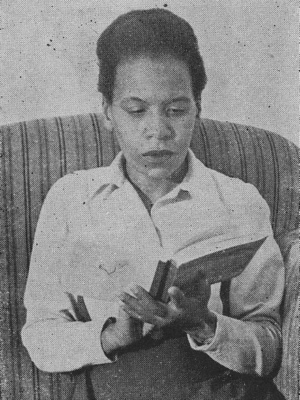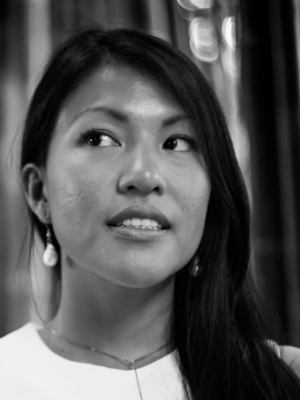Five Poems from One Hundred Prisons of Love
[translated poetry]
Untitled
Because my heart
is honey and soft wax
flesh craving a fingerprint
or just a dent––
I dream, defer, despair,
and in love’s hundred prisons,
die and die again.
* * *
Conversation with my heart
I said to my heart:
“You are tired
as a caged hawk.
You hate life.
You think your dreams
have faded in history’s shadow…
Yet I know you as a fighter,
solid as steel.
In your body runs
a slave’s blood.
Why do you flap your wings so weakly?
Why don’t you fly to the sky beyond?”
And my heart replied:
—“I love, and I wait…”
* * *
The Sea Guest
The sea wind blows on missing sails,
those sails that brought you over here.
On the ocean floor are sunk the boats,
their whale’s ribs stripped, resurfaced
in emerald. The same green cloth
cloaks all ships that harbor there.
You won’t return (with your city feet).
You know too well the water’s weeds,
that undergrowth that made you see
among them dwells a silent poetry,
a spirit tending gardens in the sea.
We know they made you dive for pearls.
We know your arm extended like a cry
for something caught below, your eyes
closing with the toll of a terrible bell.
But look carefully at this map.
Like a hawker, the land calls out.
The wind’s not the sea’s salinity.
It reeks of flesh. It reeks of bones.
A continent is simple. So constant
it nearly never clouds. Your smile
speaks of stone and earth and salt.
(Your stillness travels leagues.)
We know they made you dive for pearls.
Yet you refuse us glimmering words.
Is that because God rots inside your sores?
* * *
Trees
In this place where a voice is silent as a tree,
a man a tree,
a child a tree…
Perhaps here I mustn’t speak,
so exposed,
my words could make
the day evaporate.
I’ve come from so far, brought
my words,
my hands (bought and sold),
my belly unleashing a cry
in my voice,
my eyes.
Here a man begs,
unearthing the bones
of his smile:
blooming white flowers,
wilting white flowers.
He knows from his wound
will emerge
rivers and birds.
Unravelling:
eyes,
arms,
smile,
cipher.
How will you slake
your thirst?
With this distilled drop,
history’s tear falling
in a pond of primal sweat.
* * *
Something in my veins
I need to say it again:
it runs in my veins,
perceiving and piercing,
a dagger swathed in words.
A stone can injure me without a touch.
This pain calls me back into my body.
Hurt me, Time. Hit me, Time.
A dream escapes my body. It stands, a mute statue.
Shall I grow tall as a rose? Shall I stop bending to the wind?
The answer slides in the worker’s sweat.
Below my skin,
in my veins
lurks an unborn family.
I’ve got to move these bones,
my maybe wordless skeleton,
(my hunger) my shadowed hand.
[original text]
Five Poems from Cien Cárceles de Amor
VIRGINIA BRINDIS DE SALAS
Sin título
Porque mi corazón
es miel y blanda cera
pecho ha de ser herido
hasta que muera
y mientras sueño, espera y desespero,
y en cárceles de amor
muriendo, muero.
* * *
Mi Corazón
Dije a mi corazón:
estás cansado
como águila en prisión,
odias la vida.
Si es cierto en ti
que la ilusión perdida
se esfumó con la sombra del pasado…
Yo te sé luchador
gigante y bravo;
ha palpitado en ti
sangre de esclavo.
Y eres fuerte y viril
como el acero.
¿Por qué palpitas trágico y callado?,
¿Por qué no te libertas de tus rejas?
Y habló mi corazón:
—“Amo y espero…”
* * *
Huésped de Yodo
Todavía este viento. No para los veleros.
Sí para los que ha tiempo te navegan los ojos.
Allá los barcos fijos a los pies del océano;
allá con sus costillas de ballena sin carne
como un bosque desnudo. Todo barco que muere
se envuelve con la misma esmeralda rabiosa.
Ya no podrás volver (usan tus pies ciudades).
Además, ya conoces los árboles del agua.
los que un día te hicieron presentir en el fondo
que existe alguna cosa que hace versos, la cosa
que no es hombre y le pone jardines a los peces.
Sabemos que tu oficio fué pescador de perlas.
Sabemos que tu brazo se alargó como un grito
que algo buscas en el agua. Sin embargo, tus ojos
caen con un retazo de campana terrible.
Pero el mapa, ese mapa. ¿Tú ves bien ese mapa?
Aquí la tierra grande como un grito de pan.
Y este viento, ¿lo sientes? No es el viento marino,
huele más bien a manos, huele más bien a piernas.
Un continente es fácil. Es lo fijo tan fácil
que casi no se nubla… Tacto siempre, ¿qué más?
Tu sonrisa de piedra y un poco de tierra
y otro poco de mar. (Tu quietud hace leguas).
Sabemos que tu oficio fué pescador de perlas.
Sin embargo, tú nunca dices cosas bonitas.
¿Será porque en tu llaga Dios se te está pudriendo?
* * *
Paz de Árbol
Donde la voz parece más del árbol,
donde el hombre se un árbol
aquí donde los ojos de los niños…
Tal vez aquí no puedo decir nada,
tan cerca estoy de cosas que están
siempre, desnudas
puede mi tiempo ahora hervir la tarde.
Yo vengo de tan lejos y de tantas palabras,
vengo de tantas manos y de carne con precio,
vengo de tantos vientres con inéditos gritos,
que me sube la voz
igual que un ojo.
Aquí, donde este hombre
para decirme que no tiene
ropas,
desentierra los huesos
de su sonrisa:
tu azucena saliente y definida,
la azucena harapienta.
Es que tal vez comprende que
por su herida grande
pueden salir más
pájaros y ríos.
Se te van desprendiendo:
los ojos,
los brazos,
la sonrisa,
la voz,
tu cifra líquida.
¿Con qué entonces
vas a llenar tu aire de preguntas?
Tal vez con esta gota que está anciana de pura,
con esta gota blanca que se te cae tan vieja
como el mar que era gente en el primer sudor
* * *
Hay algo en mis venas
Vuelvo y me digo: la raíz es del hombre;
debe hacer otra vez algo en mis venas,
reconociéndolo todo, penetrándolo todo,
como un largo puñal vestido de palabra.
Yo siento que me duele la piedra sin tocarme.
Aquí la fuga es mía, la disgregada cosa.
Hacedme herida, tiempo; golpeadme, tiempo, el sueño
que por mi herida sale, la estatua de mi silencio.
Algo tendré que busco los pétalos obreros.
¿Tendré altura de rosa? ¿No mediré ya el viento?
Alguien busca y encuentra por mis perdidas venas
la familia de luces que la epidermis calla.
Estos huesos que siempre los muevo, dirigen
si el armazón no fuera de una palabra, un (hambre)
si la mano en la sombra.
TRANSLATOR’S STATEMENT
Virginia Brindis de Salas was the premier Black woman poet of Uruguay and one of the few in Latin America to publish a book in the first half of the twentieth century. These poems are from her second collection, Cien Cárceles de Amor (One Hundred Prisons of Love) published in 1949.
A Twitter feed of its time, the book contains fan mail from poets up and down the Americas (including Chilean poet Gabriela Mistral during her time in Los Angeles), as well as a closing section of poems dedicated to Brindis de Salas by other writers. This attests to her popularity as a poet whose social activism was as important as her command of music and image.
While translating, I thought often of John Keene’s essay “Translating Poetry, Translating Blackness,” as well as the changing meaning of these poems, now seven decades old. I adapted individual words and overall style to modern ears; the result is a relatively loose translation. These poems contextualize each other with their recurring evocations of body and place, sound and silence.
Virginia Brindis de Salas (1908-1958) was a Black Uruguayan poet, journalist, and member of El Círculo de Intelectuales, Artistas, Periodistas y Escritores Negros (CIAPEN), a Black cultural exchange group in Uruguay. She contributed to the Black arts journal Nuestra Raza and published two volumes of poetry before her death in Buenos Aires.
April Yee writes about colonialism and other effects of power. In 2020, her work was commended or shortlisted by Ambit, Live Canon, and the Bridport Prize. She reported in more than a dozen countries before moving to the UK, where she serves on the Refugee Journalism Project at University of the Arts London and tweets @aprilyee.






